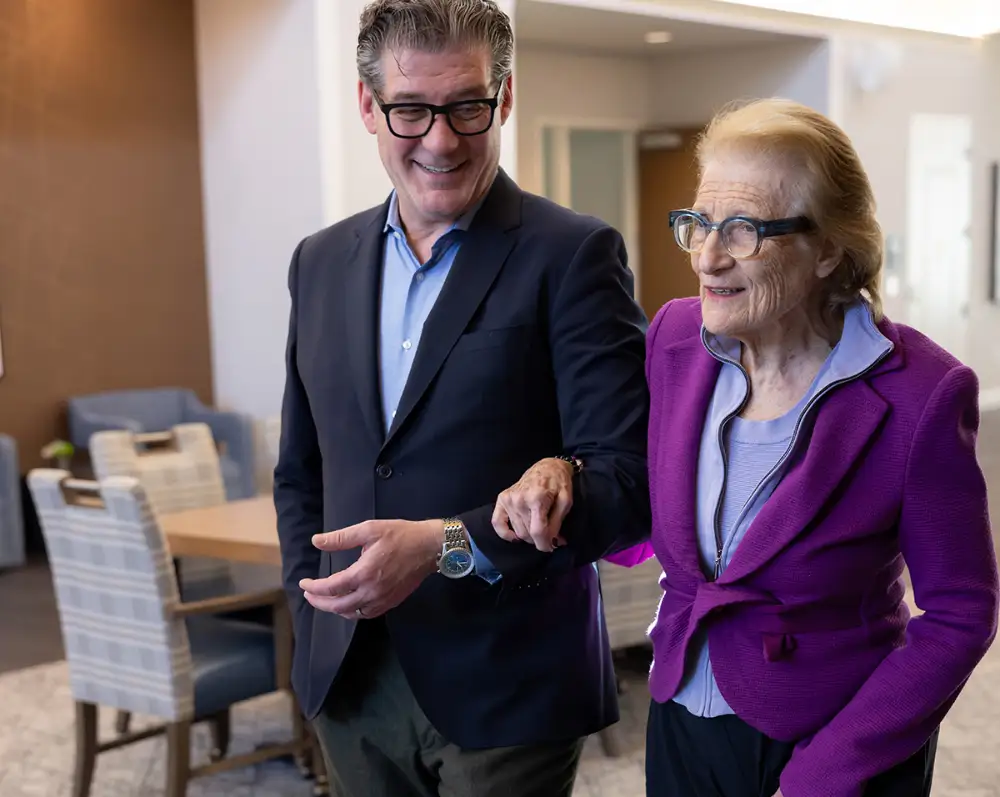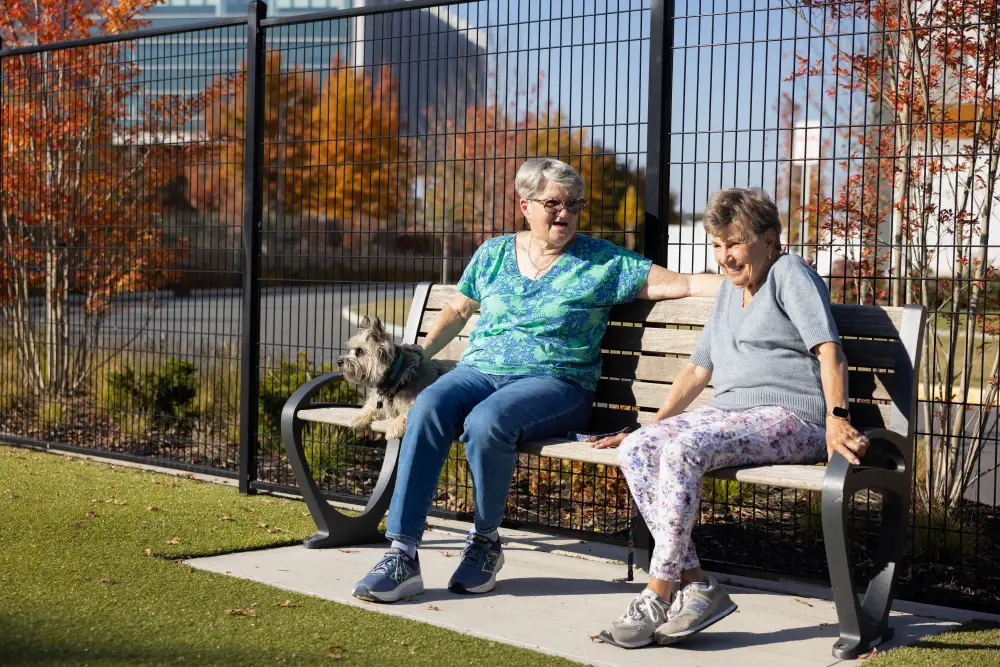Meaningful Questions To Ask Loved Ones With Dementia
Date: May 29, 2025 | Article | Reading Time: 7 minutes
Staying connected with a loved one who’s living with dementia or Alzheimer’s disease can feel challenging, especially as communication abilities change. But meaningful conversations are still possible—and even powerful—with the right approach.
It’s more than simply coming up with questions to ask loved ones with dementia to keep the conversation going—it’s about creating moments of recognition, comfort, and joy by tapping into long-term memories and shared experiences.
As dementia affects short-term memory and language processing, conversations can become more difficult over time. However, asking thoughtful, open-ended questions that reflect the person’s life story can lead to rich, rewarding interactions.
At The Delaney® at The Green, our memory care philosophy emphasizes the importance of meaningful engagement. Through person-centered dementia care, we support family members in fostering emotional connection, even in the face of cognitive decline.
The Benefits of Preparing Questions Before Your Visit
Having a few questions ready before visiting a loved one with dementia can ease anxiety—for both of you. Prepared prompts give structure to the visit and help guide conversations in ways that feel familiar and comforting to someone experiencing memory loss.
- Reduces stress and uncertainty during interactions
- Helps maintain emotional bonds by tapping into familiar topics
- Provides a framework for success, especially when verbal communication becomes limited
- Encourages active participation from the person living with dementia
At The Delaney at The Green, we work closely with families to help prepare for visits that are emotionally enriching and personally meaningful.
Questions About Childhood Memories
Long-term memories, childhood memories, often remain accessible even as short-term memory declines. These memories are tied to strong emotions and senses, making them powerful conversation starters.
- “I remember catching fireflies in glass jars during summer evenings. What summer activities did you enjoy as a child?”
- “The smell of cinnamon always reminds me of helping in the kitchen as a child. Who was the cook in your family growing up?”
- “I found an old marble collection in my attic that reminded me of childhood games. What games did you play with friends after school?”
Our life story work at The Delaney helps staff learn about each resident’s personal history so we can revisit meaningful memories together.
Questions About Family Traditions
Talking about family members and long-held traditions can spark meaningful memories and create a sense of comfort and belonging. These thoughtful questions can help encourage reflection and conversation:
- “I just pulled out my grandmother’s recipe for the homemade cookies we made every holiday. Did your family have special weekend food traditions?”
- “In our family, birthdays always included a special breakfast. How did your family celebrate birthdays when you were growing up?”
- “My father would always whistle a particular tune when he came home from work. Did your family have any little signals or routines you remember?”
At The Delaney, we incorporate beloved traditions into memory care activities to help preserve identity and comfort.

Questions About Work and Career
Talking about one’s career can support a sense of identity and purpose—especially when framed in positive, affirming ways.
- “I’m reorganizing my home office this weekend. What was your workspace like during your career?”
- “I just had lunch with a former colleague who always brightened our office meetings. Were there particular coworkers who made your workplace more enjoyable?”
- “I received a thank-you note from a client that made my day. What kinds of recognition meant the most to you in your work life?”
Our memory care program includes vocational-style activities that honor residents’ past roles and achievements.
Questions About Sports and Recreation
Sports and physical activities can trigger fond memories and emotional connections.
- “I just joined a bowling league that meets on Thursdays. Did you ever enjoy bowling or similar activities with friends?”
- “The lake near my house reminds me of learning to swim as a child. Did you spend time around water growing up?”
- “I watched an old basketball championship game on TV yesterday. Which sports did you find most exciting to watch?”
Questions About Music and Entertainment
Music memory is often remarkably preserved in people with dementia—even in advanced stages.
- “This song reminds me of dancing at parties. Did you enjoy dancing?”
- “I remember seeing [movie/show] as a child. What kinds of [movies/shows] did you enjoy?”
- “This music makes me feel happy. What kind of music puts you in a good mood?”
The Delaney’s music therapy sessions use familiar tunes to lift spirits and support emotional well-being.
Questions About Food and Cooking
Sensory memories tied to taste and smell are strong and can unlock vivid stories.
- “I’m making lasagna this weekend, which reminds me of family gatherings. What foods remind you of special occasions?”
- “I love the smell of bread baking. Are there food smells you particularly enjoy?”
- “My mother made the best apple pie. Was there a special dish someone in your family was known for?”
Questions About Places and Travel
Conversations about geography and travel can inspire storytelling and nostalgia.
- “I visited the mountains last weekend. Have you spent time in the mountains?”
- “I grew up in a small town with one main street. What was the place you grew up like?”
- “I’d love to visit Paris someday. Were there places you loved to visit?”
Adapting Your Approach As Dementia Progresses
As dementia advances, it may be necessary to shift how you ask questions.
- Transition from open-ended to simpler, yes/no or choice-based questions.
- Use visual cues or personal objects to support conversations.
- Rely more on facial expressions, touch, and tone of voice to convey care.
- Understand that the effort to connect matters more than perfect responses.
The Delaney’s dementia care team adapts communication techniques to meet each resident where they are, ensuring dignity and comfort.
Tips for Successful Conversations
- Choose a quiet, familiar setting with minimal distractions.
- Be patient—allow extra time for responses without rushing.
- Use photos, keepsakes, music or scents as conversation starters.
- If a question causes confusion, gently change the subject or reframe it.
- Always respond with kindness, even when stories are repeated.
How These Conversations Improve Quality of Life
Meaningful social interaction supports emotional well-being and reduces agitation in people with dementia. When we ask thoughtful questions, we affirm their identity, validate their experiences, and enhance their overall quality of life.
Even brief moments of connection can:
- Spark joy and reduce feelings of isolation
- Improve mood and reduce challenging behaviors
- Strengthen the bond between caregivers, family, and loved ones
Remember That Connection Is Always Possible
Even as dementia changes how we communicate, it doesn’t take away the ability to connect. When we lead with empathy and intention, even a simple question can spark joy, evoke a memory or offer comfort.
Keep the focus on meaningful moments—however brief they may be—and approach each interaction with patience, curiosity, and love.

Find Memory Care That Values Connection
Looking for memory care that prioritizes meaningful communication for your loved one? At The Delaney at The Green, we understand how important it is to stay emotionally connected—especially when a loved one is living with dementia.
Led by memory care expert Dr. Napchan, our specialized team focuses on thoughtful, person-centered communication that supports emotional well-being and honors each resident’s unique story. We adapt our approach to meet each person’s needs at every stage of dementia, ensuring comfort, dignity, and meaningful connection throughout the journey.
Contact us today to schedule a tour of our memory care neighborhood and meet the compassionate professionals who make connections possible every day.
